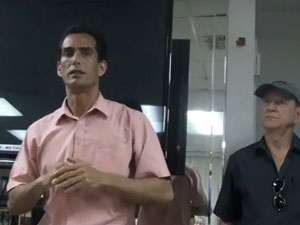Two Cuban diplomats are making a visit to Miami to hold meetings with migrants, representatives of travel agencies and advocacy groups to normalize U.S. relations with Cuba.
Llanio González Pérez, Consul General of the U.S. Interests Section in Cuba in Washington, and Armando Bencomo, vice consul, arrived Sunday night south Florida and have conducted private meetings with entrepreneurs, organizations and local residents.
.. It is the second time that Cuban diplomats traveling to Florida so far this year. In late March, officials from the Interests, including Gonzalez, attended a two-day conference entitled Rapprochement With Cuba: Good for Tampa, Good for Florida, Good for America (Rapprochement with Cuba: Good for Tampa, good for Florida, good for America) held in Tampa.
Among his words we could highlight these:
Gonzalez called important step the government decision to extend the stay of Cubans who travel abroad to 24 months without losing their rights on the island. He also referred to the new qualification system for Cubans traveling from abroad will be made only once, and is valid on passport renewals.
“Enabling is done once, but it is still with you, unless you do something very strong against our country and lend itself to that kind of campaign [against the government], but usually once it hits you in the passport and to As the passport is still with you prorrogándose empowerment and will give you three months in Cuba, “said Gonzalez, who previously served as a diplomat in Bolivia.
About the people who travel to Cuba frequently:
“Those people who have the facility to be going and turning and practically live on both sides, and that is a phenomenon should be more common especially with these new waves”, the official said.
“Agenda is family travel, family agenda is that I wish that one day the lock is removed [however], and you can charge perfectly his retirement in Cuba,” said the official. By embargo provisions, residents and U.S. citizens can not receive financial transactions or Social Security benefits on the island.
He also referred to the growing number of requests for repatriation and facilities to the Immigration and Nationality is granting the petitioners, but specified that one of the problems which limits this process is the housing problem.
“Today there are many people asking for repatriation to Cuba and Immigration and is not in the strict criteria,” said Gonzalez. “But there are relatives who had remained in the family home for 20 years, and I told him good because I have my house, I have my son in the other room, my uncle I know it was, but here I want not I have come because they where put it. ”
He said the government can not guarantee housing in these cases, and would create an impact and a negative image that a person come from somewhere else and be granted a home when there are people with serious housing problems in Cuba today.
Applications for repatriation
But he insisted that the phenomenon of repatriation will continue to increase, especially among elderly Cubans living in the United States.
“Many Cubans who are here say, well, I have a certain age, Cuba did not prohibit or out or come in, then I’m going to repatriate, I keep all my rights in the United States, which took 20 years to reach Cuba give and the repatriation and re-incorporate all rights in Cuba, “he said.
He added that among returnees many people are tempted to start businesses and buy homes under the new provisions introduced by President Raul Castro. “And then the two sides maintain its properties in the U.S. and are also in Cuba,” he said. “It is something that is going to give more with new waves of immigration, which ever going to see more movement of people between the two countries more.
Cuban may invest
In connection with the Cuban reality, Gonzalez said the country is in a “process of great change”, not only in terms of updating the economic model, but also for the institutionalization and establishment of new laws that are under study.
He announced that soon will be ready a new Foreign Investment Law, which include the possibility of Cubans living abroad to invest in businesses on the island.
Gonzalez addressed the issue of the Cuban Adjustment Lery (CAA), which has been challenged by political leaders like Cuban-American Senator Marco Rubio, after application of immigration reform on the island.
.. and denied that the extension of the residence permit of Cubans abroad to 24 months has been motivated by the CAA, in force since 1966.
He then referred to resume migration talks between Washington and Havana, scheduled for July 17. The meetings on migration were frozen since January 2011, following the escalation of tensions in the case of U.S. contractor Alan Gross, sentenced to 15 years in prison on the island.
Sources: CafeFuerte/WilfredoCancioIsla/Excerpts/InternetPhotos/www.thecubanhistory.com
CUBAN GOVERNMENT DIPLOMATS meet with Cuban exiles in MIAMI
The Cuban History, Arnoldo Varona, Editor
DIPLOMATICOS CUBANOS SE REUNEN CON EXILADOS EN MIAMI.
Dos diplomáticos cubanos se encuentran realizando una visita a Miami para sostener encuentros con emigrados, representantes de agencias de viajes y grupos partidarios de normalizar las relaciones de Estados Unidos con la isla.
Llanio González Pérez, cónsul general de la Oficina de Intereses de Cuba en Washington, y Armando Bencomo, vicecónsul, arribaron la noche del domingo al sur de la Florida y han efectuado reuniones privadas con empresarios, organizaciones y residentes locales.
.. Es la segunda vez que diplomáticos cubanos viajan a la Florida en lo que va de año. A finales de marzo, funcionarios de la Oficina de Intereses, entre ellos González, participaron en una conferencia de dos días titulada Rapprochement With Cuba: Good for Tampa, Good for Florida, Good for America (Acercamiento con Cuba: Bueno para Tampa, bueno para Florida, bueno para EEUU), celebrada en Tampa.
Entre sus palabras se pudieron destacar estas:
González calificó de importante paso la decisión gubernamental de ampliar la estadía de los cubanos que viajan al exterior a 24 meses, sin perder sus derechos en la isla.
Se refirió además a que el nuevo sistema de habilitación para los cubanos que viajan desde el extranjero se hará solo una vez, y tendrá validez en las sucesivas renovaciones del pasaporte.
“La habilitación se hace una vez, pero ya sigue contigo, salvo que hagas algo muy fuerte contra nuestro país y que se presten para ese tipo de campaña [contra el gobierno], pero normalmente una vez que se te pega en el pasaporte ya a medida que el pasaporte va prorrogándose la habilitación sigue contigo y te permite estar tres meses en Cuba”, explicó González, quien anteriormente sirvió como diplomático en Bolivia.
Sobre las personas que viajan a Cuba frecuentemente:
“Esas personas que tiene la facilidad de estar yendo y virando ya prácticamente viven en los dos lados, y ese es un fenómeno debe darse con mayor frecuencia sobre todo con estas nuevas oleadas”, señaló el funcionario.
“Agenda familiar es viajes, agenda familiar es que ojalá que un día se elimine lo del bloqueo [embargo], y que ustedes puedan cobrar perfectamente su retiro en Cuba”, comentó el funcionario. Por disposiciones del embargo, los residentes y ciudadanos estadounidenses no pueden recibir transacciones financieras ni beneficios del Seguro Social en la isla.
También se refirió al creciente número de solicitudes de repatriación y las facilidades que la Dirección de Inmigración y Extranjería está concediendo a los peticionarios, aunque especificó que uno de los problemas que limita este proceso es el problema de la vivienda.
“Hoy hay mucha gente pidiendo repatriación para Cuba y ya Inmigración no está en los criterios estrictos”, manifestó González. “Pero hay familiares que se habían quedado en la casa familiar hacía 20 años, y le decían bueno ya yo tengo mi casa, tengo a mi hijo en el otro cuarto, mi tio yo se que se fue, lo quiero pero para acá que no venga porque no tengo donde meterlo”.
Dijo que el gobierno no puede garantizar vivienda en estos casos, y crearía un impacto y una imagen negativa que venga una persona de otro lugar y se le conceda una casa cuando hay personas con graves problemas habitacionales en la Cuba de hoy.
Solicitudes de repatriación
Pero insistió en que el fenómeno de la repatriación va a continuar incrementándose, especialmente entre los cubanos de edad avanzada que residen en Estados Unidos.
“Muchos cubanos que están acá dicen, bueno, ya yo tengo cierta edad, Cuba no me prohíbe ni salir ni entrar, entonces yo voy a repatriarme, mantengo todos mis derechos en Estados Unidos, donde llevo 20 años, al llegar a Cuba le dan la repatriación y ya el vuelve a incorporar todos sus derechos en Cuba”, señaló.
Añadió que entre los repatriados muchas personas están tentadas a abrir negocios y comprar casas en virtud de las nuevas disposiciones establecidas por el gobernante Raúl Castro. “Y entonces mantienen los dos lados, sus propiedades en Estados Unidos y están también en Cuba”, apuntó. “Es un fenómeno que se va a dar mas con las nuevas oleadas migratorias, que cada vez va a ver mas circulación de mas personas entre ambos países.
Cubanos podrán invertir
En relación con la realidad cubana, González dijo que el país está en un “proceso de grandes cambios”, no solo en lo que respecta a la actualización del modelo económico, sino también por la institucionalización y establecimiento de nuevas leyes que están bajo estudio.
Anuinció que pronto estará lista una nueva Ley de Inversión Extranjera, que incluirá la posibilidad de cubanos residentes en el extranjero puedan invertir en negocios en la isla.
González abordó el tema de la Lery de Ajuste Cubano (CAA), que ha sido cuestionada por líderes políticos como el senador cubanoamericano Marco Rubio, tras la aplicación de la reforma migratoria en la isla.
.. y negó que la ampliación del permiso de permanencia de los cubanos en el exterior a 24 meses haya estado motivado por la CAA, vigente desde 1966.
Seguidamente se refirió a la reanudación de las conversaciones migratorias entre Washington y La Habana, fijadas para el próximo 17 de julio. Los encuentros sobre temas migratorios estaban congelados desde enero del 2011, a raíz del agravamiento de las tensiones por el caso del contratista estadounidense Alan Gross, condenado a 15 años de prisión en la isla.
Sources: CafeFuerte/WilfredoCancioIsla/Excerpts/InternetPhotos/www.thecubanhistory.com
CUBAN GOVERNMENT DIPLOMATS meet with Cuban exiles in MIAMI
The Cuban History, Arnoldo Varona, Editor





